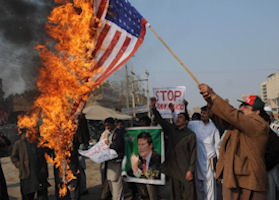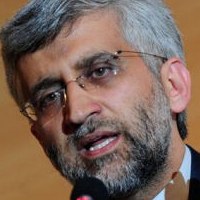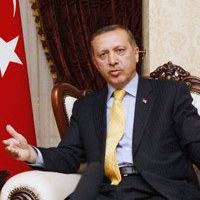![]()
By Abigail R. Esman

A Pakistani protester holds a burning U.S. flag during a Jan. 11 demonstration against drone attacks in Pakistani tribal areas. (S.S. Mirza/AFP/Getty Images)
As Pakistanis burned American flags and the Washington Post wrote of “a new normal” in US-Pakistani relations earlier this month, it looked like the beginning of the end of five decades of friendly alliance between the two countries. Errant US air strikes resulted in the deaths of more than 20 Pakistani troops last November, infuriating Pakistan, even as most US counterterrorism officials and pundits believe — with reason — that Pakistan deliberately kept Osama bin Laden’s whereabouts secret as he took shelter within a fortified compound in Abbottabad. Now Pakistan is busy reconsidering its ties to the US.
But while the US-Pakistan alliance has its strategic advantages — particularly in light of the war in Afghanistan — the truth is, we should have parted ways long ago. As work by non-governmental groups, dedicated reporters, and women’s rights advocates brings the truths of Pakistani culture to light, it has exposed the alarming horror of the country’s brutal tribalism and human rights abuses, its rampant religious extremism, and its barbaric oppression of women and non-Muslims in all areas of life. Meantime, American intelligence officials, especially Mike Mullen, chairman of the Joint Chiefs of Staff, believe strongly that the Pakistan government — specifically, its Inter-Services Intelligence Committee (ISI) has ties to some of the most dangerous terrorist groups in the country, including the Haqqani insurgent network. Over and over again lately I am reminded of the words of a former CIA agent, a Pakistani-American who told me, years ago, “We don’t belong in Afghanistan and Iraq. The real problem is in Pakistan, and we need to address it before it is too late.”
Well, we didn’t.
And now it nearly is too late.
There’s a lot you don’t hear about Pakistan if you simply follow the news — even off-beat news. You might not have read, for instance, about the man by the name of Jurian who, in 2002, signed his name on a national identity document, calling himself “Jew Jurian” and was subsequently declared Jewish. Except that Jurian isn’t Jewish; he’s Christian, which is bad enough in Pakistan as it is. Soon after, he was arrested and charged with blasphemy — a charge which, in Pakistan, can carry the death penalty. According to a report in the Express Tribune, although he was released in 2003, he continues to receive death threats. Such is the plight of Jews in this country we call our ally and our friend.
But it’s not just Jews, of course. Any non-Muslim is exposed to the possibility of death at any time, and that includes Ahmadis, a sect whose members call themselves Muslim but are nonetheless forbidden by Pakistani law to do so. According to a report from Human Rights First, in a similar case, the Pakistani Supreme Court “asserted that self-identification of the Ahmadis as Muslims offends and outrages the religious feelings of Pakistan’s Sunni Muslims. Approximately 3.5 million Ahmadis live in Pakistan,” though they are forbidden by law to recite Islamic prayers or fast on Ramadan.
“Offending” the religious feelings of Pakistanis is a concept that should be familiar to most of us in the West by now: it was just such “offense” that caused the deaths of eight people when a bomb exploded at the Danish embassy in Islamabad — the Pakistani way of responding to the so-called Danish cartoons in 2008. (It is worth noting that the cartoons themselves were published in 2005. It seems they have a grudge problem in Pakistan.)
Women, too, suffer hideously in Pakistan, where 77 percent of all honor killings go unpunished, according to a recent report. And even in Pakistani families in England and the USA, forced marriages are not uncommon; British authorities estimate a whopping 3,000-8,000 such arrangements take place among Pakistani-British (and Bangladeshi) families each year, while girls who refuse risk becoming the victims of honor killings.
But mostly, it’s the Jews they hate. (There was, after all, Daniel Pearl.) According to a Memri report, the following beliefs are not uncommon among our Pakistani friends:
- Polio Vaccination Campaign — A Dangerous Jewish Conspiracy
- The U.N. — A Jewish Conspiracy
- Valentine’s Day and April’s Fool Day — Used by Jews and Hindus against Muslims
- Ahmadi Muslims — Agents of Israel/India
- Video of Taliban Flogging Woman — Made by Jews to Smear Pakistan
- Facebook — A Jewish Conspiracy
- Pakistan’s Nuclear Weapons — Targeted by Jews/Israel
- Faisal Shehzad’s Times Square Attack — A CIA/Mossad Plot to Implicate Pakistan
It gets better. Also according to Memri, “Pakistan has seen a wave of suicide attacks in recent years. There is a trend of explaining such threats to Pakistan as emanating from outside Pakistan. For example, the Pakistani leaders generally accuse the Taliban militants of being agents of the United States, India and Israel.” Even more bizarre is the thinking that, Memri explains, underlies the polio vaccine conspiracy theory:
In October 2009, Mahnama Banat-e-Aisha, an Urdu-language monthly magazine which is part of the Haftroza Al-Qalam group of publications belonging to the militant group Jaish-e-Muhammad, alleged in a lengthy article that the international polio eradication campaign was a “dangerous Jewish conspiracy.” The article, “Polio: Disease or Dangerous Jewish Conspiracy,” read in part:
“The Jews, who dream of ruling the world, have invented different types of vaccines, drugs, and injections in an organized way to weaken Muslims in their beliefs on spiritual, practical, and moral levels, and make their bodies contaminated.
“The oral polio vaccine campaign is being run under a worldwide conspiracy — except in the Zionist countries. Its total focus is now on South Asian countries — India, Pakistan, and Bangladesh. The U.S. has already marked this area as an extremely strategic region…”
There’s nothing new, of course, about NATO playing with countries whose human rights abuses we find anathema, at best, and certainly nothing new about NATO’s friendships with countries so openly anti-Semitic; but when we join countries like Saudi Arabia on the global playground, we create our strategy, at least, with our eyes open (before we deliberately close them, anyway). In dealing with Pakistan, we have stubbornly kept our eyes glued shut, and even in the wake of the discovery of bin Laden hiding there in plain sight, we have by and large failed to look directly at the atrocities that really go on within its borders. It is as if Pakistan’s nuclear capabilities — and geographic circumstance — have bought them free reign — allowing them to enjoy benefits with the US (especially) that we denied to Russia and South Korea, and are preparing to deny Iran.
Why?
Fortunately for NATO and America, Pakistan is all but ready to break ties, even if we can’t see the advantages. According to the Pakistan Observer, “The overwhelming majority of public (more than 90 %) is against Pak-US relations. Just like US military-industrial complex, a powerful lobby in Pakistan supports Pak-US relations to protect its profits in US and Afghanistan.”
The Observer is also clear-eyed about the fundamental ideological conflicts between Pakistan and its Western allies. “There are fundamental differences in Pak-US policies on human rights, Constitutions, economic models, political systems and even the internet,” it reports. (Glad someone out there is paying attention.) But in a spectacular example of the twisted Pakistani mind, it then goes on, “Pakistan and America cannot get along due to fundamental differences. The violation of human rights including use of drones, no accountability for forced sterilization, police state and racism is part of America’s policies. Unlike US, the extra judicial killings, racism and forced sterilization are crimes in Pakistan. Our Constitution envisages a welfare state, a parliamentary form of government, no fixed term for the PM, independent judiciary, Sharia based law, Freedom of Information, internet freedom, and a government obliged to protect rights of weak against strong including equitable wealth distribution.”
Yup. They really wrote this — about Pakistan, that country where, as Mira Sethi observed in The Wall Street Journal, “Last year saw the assassination in broad daylight of Salmaan Taseer, the governor of Pakistan’s largest province, whom media had vilified for criticizing the country’s notorious blasphemy laws and championing the cause of a Christian woman sentenced under them. Taseer’s assassin — one of his own bodyguards — instantly became a hero in many quarters. Four months later, investigative journalist Saleem Shahzad was abducted, tortured and killed after he exposed al Qaeda’s infiltration of the Pakistani Navy. ISI involvement in Shahzad’s killing is widely suspected though it was officially denied by a recent commission of inquiry led by a supreme court judge.”
And then, you know, that Bin Laden thing.
(In fairness, it might be worth considering that the Pakistani author’s utter inability to compose a grammatically-correct sentence in English might also suggest an inability to fully comprehend any information he receives in English, which would explain his complete and utter inability, too, to get his facts right.)
And yet, even as Pakistan reviews its ties to Western states, rejecting even a visit from Washington envoy Marc Grossman; even with evidence of collaborations between the ISI and the Haqqani ntwork — which just happens to be among the terrorist groups fighting the US-NATO forces in Afghanistan as allies of the Taliban — the US continues to maintain, almost pleadingly, the insistence that Pakistan serves a vital purpose in NATO’s efforts to exit gracefully — and safely — from the Afghan conflict. “Pakistan’s cooperation is regarded as crucial,” Reuters reports, “because of its long history of association with militant groups, to efforts to persuade the Taliban to join negotiations.” In other words, we want to stay friendly with Pakistan because they are the friends of the enemy; yet what few are willing to recognize is that we are endangered by Pakistan for the very same reason.
Those who oppose cutting ties argue, as Shuja Nawaz did in the New York Times last May, that to do so would pose “disastrous” consequences for both countries. “The U.S. would lose primary access via Pakistan for its supplies to fight the war in Afghanistan at a critical stage in that conflict, Nawaz stated.
Well, we’re exiting Afghanistan. How important is that access now? And have we ever really had it? Or have we been kidding ourselves, again?
Nawaz also worries — as do others — about the outcome of America’s cutting aid to Pakistan — some $3 billion a year, which, he argues, helps fund Pakistan’s “war against terrorism and the Pakistani Taliban.”
Except that, in real life, Pakistan doesn’t seem to be interested in fighting terrorism or the Pakistani Taliban. To the contrary, they seem to be better buddies with the terrorists and AfPak Taliban leaders than they are with most Western diplomats — or, for that matter, with their own Ambassadors. Indeed, one has to wonder, given the proliferation of Pakistan-based terrorist training camps, the number of Pakistani (and Pakistani-British) terrorists who have been arrested in recent years (and those whose efforts at mass murder were thwarted only by their own incompetence), where, exactly, that money is really going.
For her must-read WSJ piece, Sethi interviewed Hussein Haqqani, the country’s former Ambassador to the US (who is now suspected of treason) in his home country. Haqqani (who bears no known relation to the network of the same name) spoke candidly about the US-Pakistan situation, and his concerns about the Obama administration. It “does not have the human resources right now to fully understand the complexities of Pakistan and engage with them,” Haqqani told the Journal. “They don’t have the people who understand.”
Exactly. But the bigger question is whether anyone in American power really does.
Abigail R. Esman is an award-winning journalist based in New York and the Netherlands. The author of “Radical State: How Jihad Is Winning Over Democracy In the West” (Praeger, 2010), she pens a weekly column for Forbes.com. Her work has also appeared in The New Republic, Salon.com, Foreign Policy, The Nation, the Wall Street Journal, and numerous other publications internationally. Her personal website is at AbigailEsman.com. For all the exclusive blog entries by Abigail R. Esman, go here.
© CrethiPlethi.com, 2012. This article may be reprinted (in full length) as long as information is provided about its author, date, place of publication, and original URL.



 RSS
RSS










Article by Abigail Esman http://t.co/AazKc1uY
Article by Abigail Esman http://t.co/AazKc1uY
[…] and numerous other publications internationally. Her personal website is at AbigailEsman.com. Why We Should End Our Relationship With Pakistan | Middle East, Israel, Arab World, Southwest Asia, … Reply With Quote + Reply to Thread « Official: Pakistan […]
RT @crethiplethi: Why We Should End Our Relationship With Pakistan http://t.co/e2hMi4aa
We tried ending our relationship with Pakistan after the 1965 war, after Z.A. Bhutto’s execution, and after the Cold War was over. Each time Pakistan sought to end the relationship on the grounds that America didn’t deliver and each time when America complied with Pakistani wishes it was referred to ever-afterward as ‘abandonment’ – as if Pakistanis were French peasants and America their easily-tricked and exploited duke.
Bottom line: Pakistanis need to grow up and America needs to stop “helping” so they can fail or succeed without a net and be an ally or enemy based on conduct rather than promises or “chemistry” between U.S. and Pakistani officials.